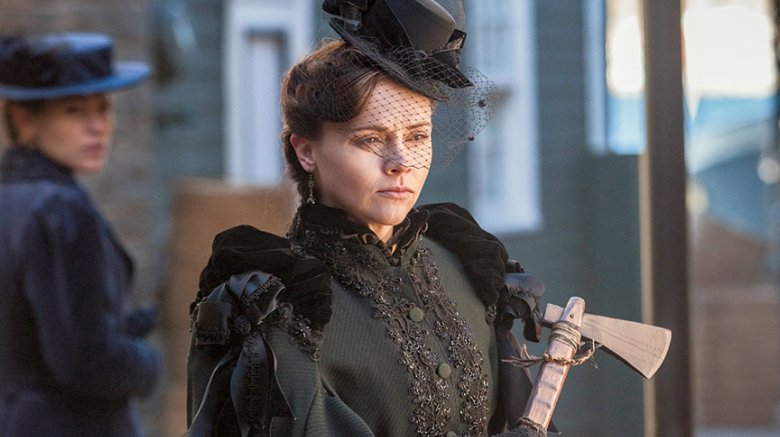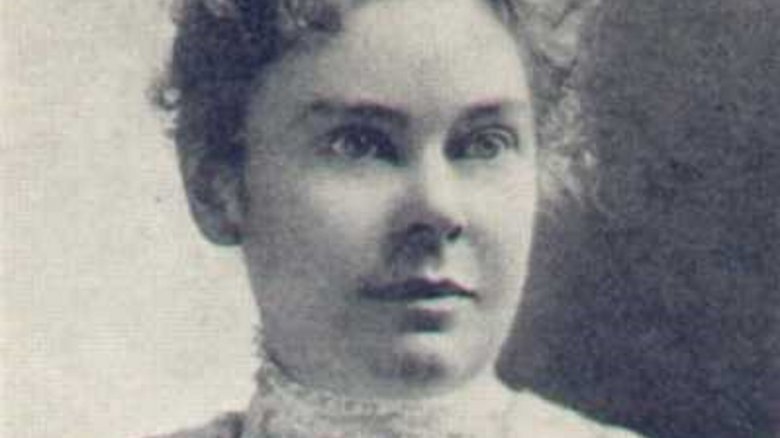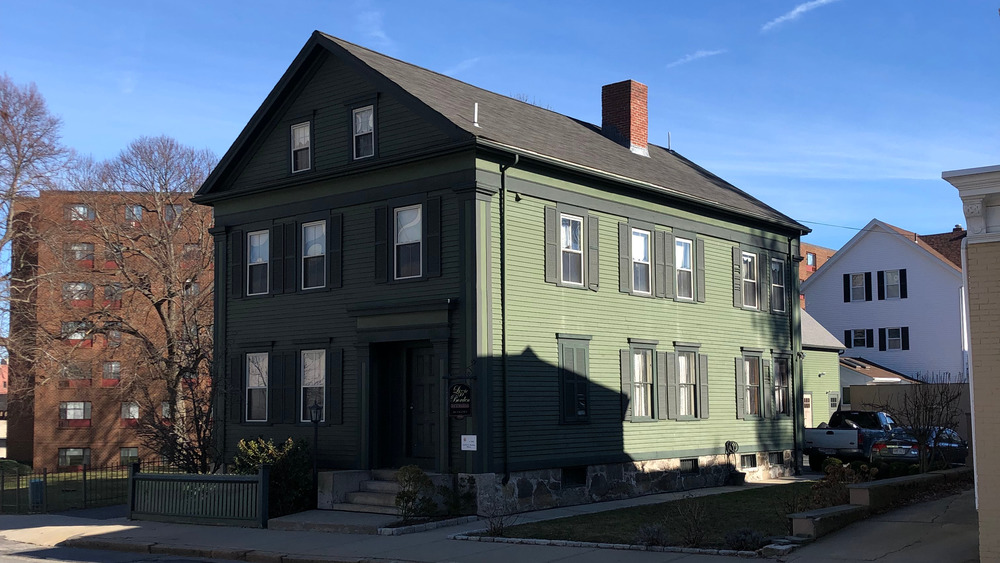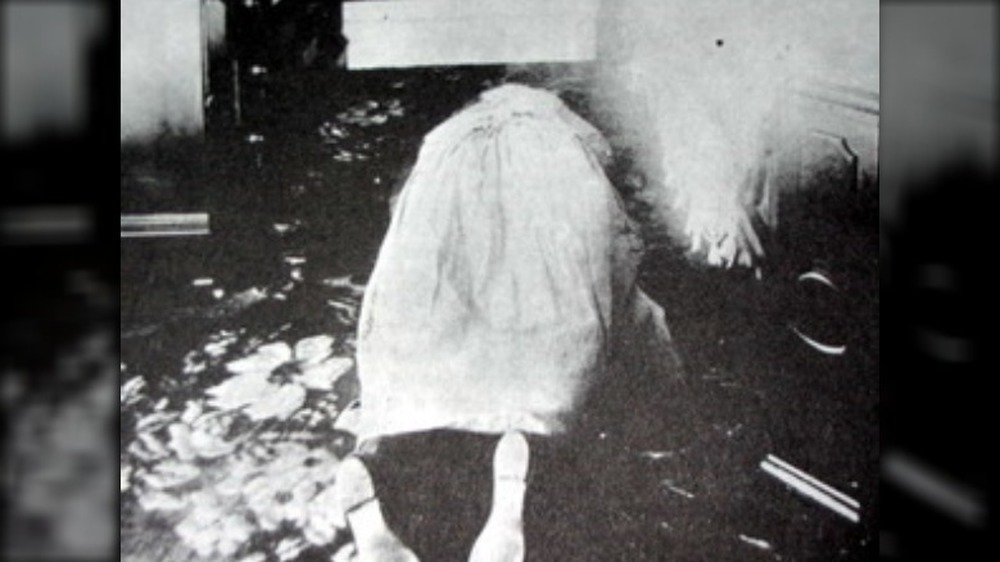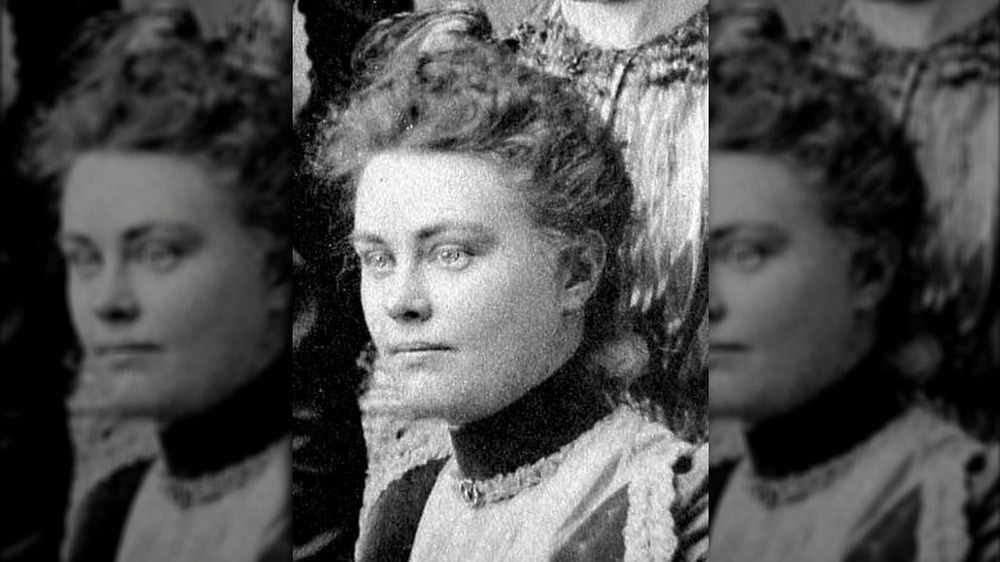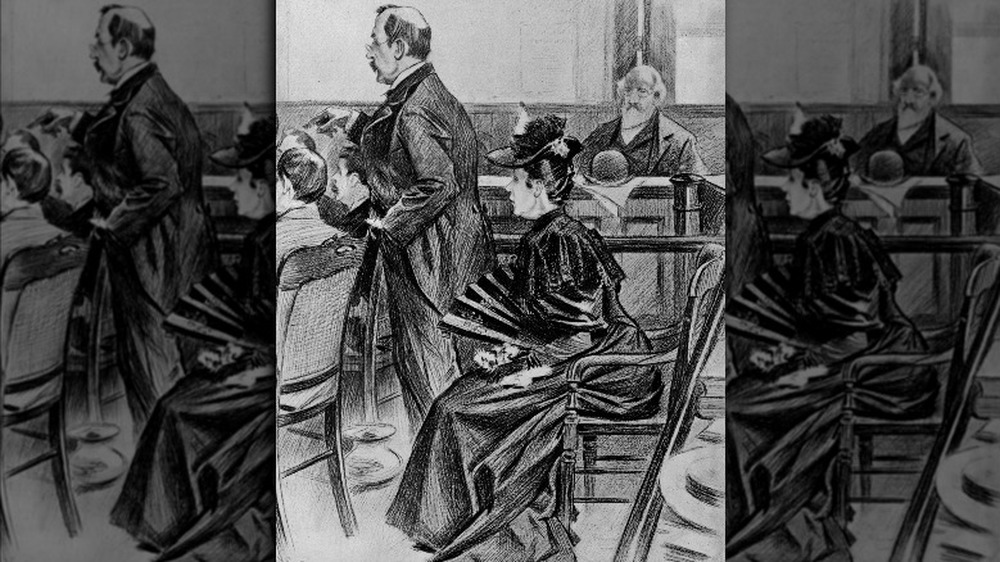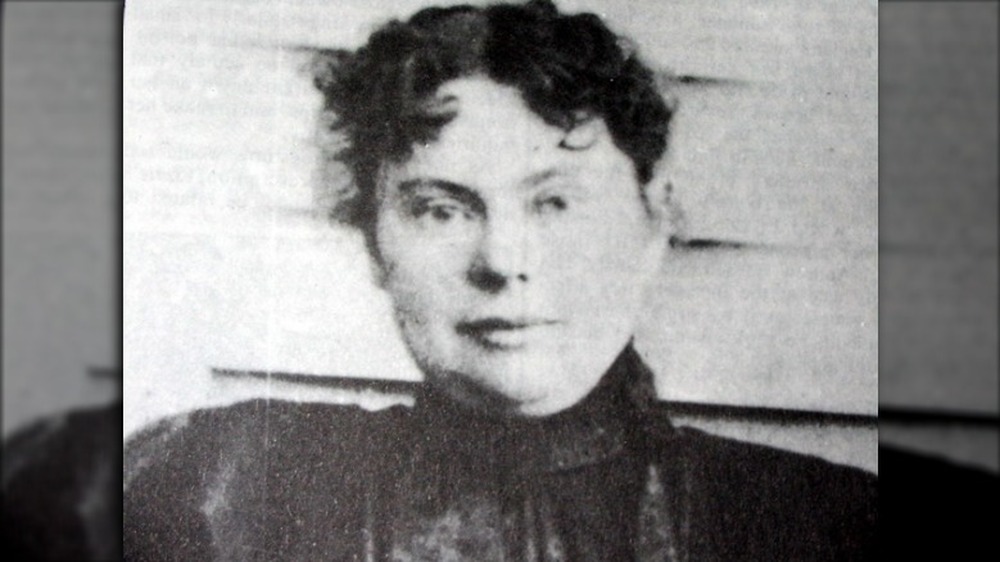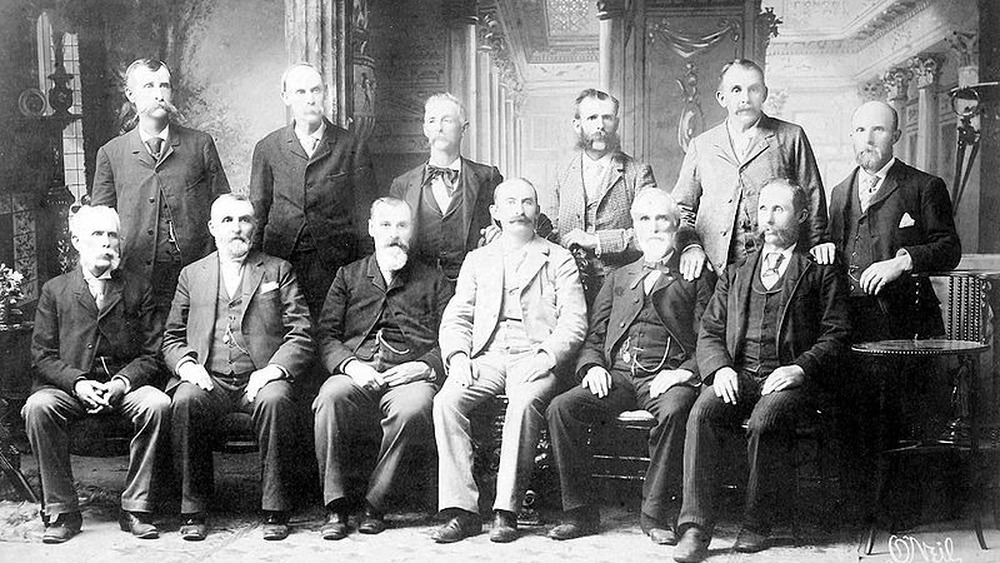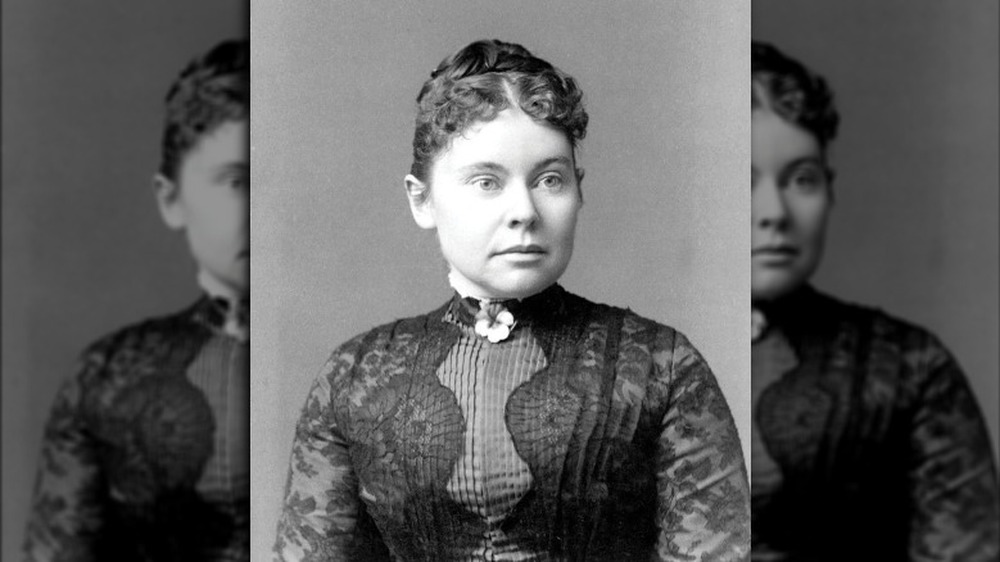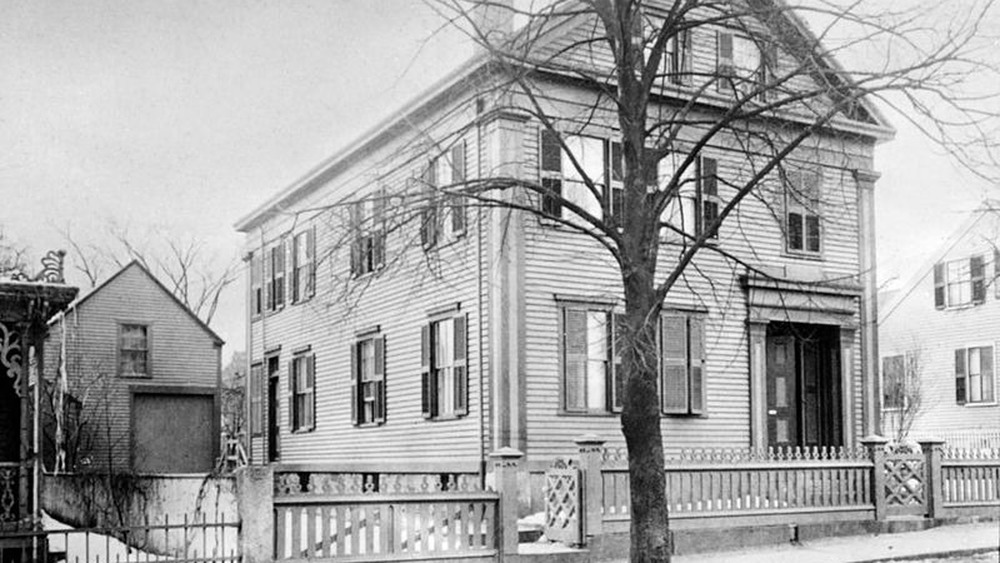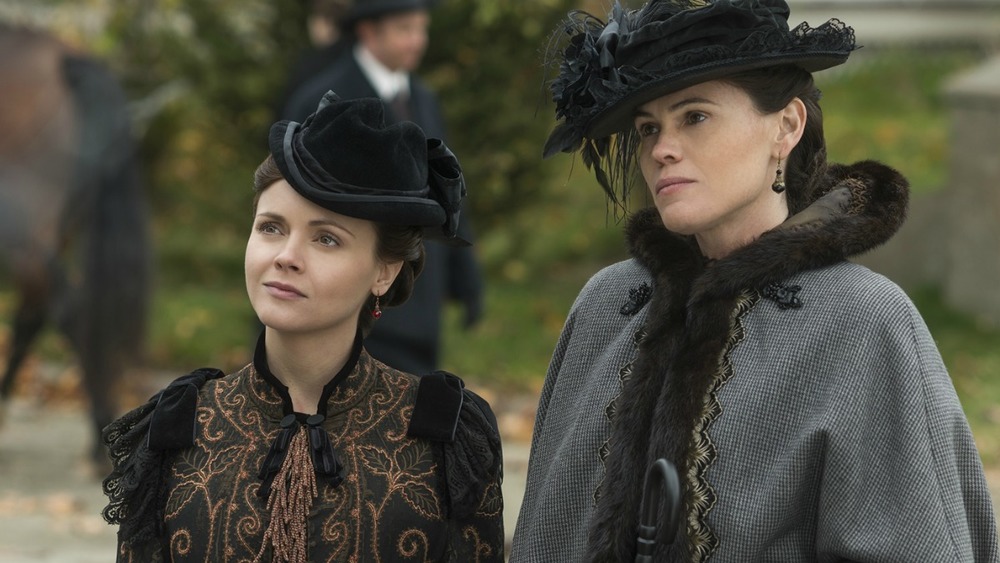The Untold Truth Of Lizzie Borden
Before Casey Anthony or O.J. Simpson or any of the other infamous modern accused murderers, there was Lizzie Borden. In the 1800s, the story of the ax-wielding spinster was a national phenomenon, headlining newspapers across America and inspiring one of the creepiest poems of all time.
Lizzie Borden took an ax
And gave her mother forty whacks.
When she saw what she had done,
She gave her father forty-one.
But did the infamous Ms. Borden, portrayed above by Christina Ricci, actually butcher her parents, or was she innocent of the crime that claimed the lives of her father and stepmother? No one was sure then and no one is sure now. There's plenty of evidence of her guilt and things that point towards her innocence. But either way, this morbid tale of Massachusetts murder deserves further investigation, so check your house for ax murderers before you delve into the untold truth of Lizzie Borden.
Who was Lizzie Borden?
Born in 1860, Lizzie Borden was the youngest child of Andrew and Sarah Borden. Tragically, Lizzie's mother passed away when the girl was just 2-years-old, and she spent most of her life with her stepmom, Abby. Decades later, at the age of 32, Lizzie had become a prominent figure in her hometown of Fall River. She was energetic and outgoing, especially compared to her 41-year-old wallflower sister Emma. In addition to teaching Sunday school, Lizzie kept herself busy singing in a church choir and delivering baskets and bouquets to the sick and poor. She campaigned against alcohol as a member of the Women's Christian Temperance Union, worked at a charity hospital, and served as the secretary treasurer for the Christian Endeavor Society (basically a 19th-century youth group). She even prepared turkey dinners on Christmas for underprivileged kids. Girl scouts have darker pastimes.
Neither of the Borden sisters was married, which was unusual for the time. As a result, Lizzie and Emma lived at home with their 70-year-old father, Andrew. He started off as an undertaker before making it big in real estate and the banking business. But even though he was one of the wealthiest men in Fall River, most described Andrew as a notorious penny-pincher. As for his second wife, the 63-year-old Abby, most sources claim she didn't really get along with her stepdaughters. In fact, Dead Men Do Tell Tales says the two girls supposedly referred to their stepmom as "Mrs. Borden."
With a stingy dad and a stepmother she didn't like, Lizzie wasn't crazy about her home life, and as it turns out, Lizzie's relationship with her parents was about to suffer some serious blows.
The lead-up to the murders
On August 4, 1892, Bridget "Maggie" Sullivan woke up with a serious case of nausea, according to the New York Times, bad enough that she vomited after preparing breakfast. Sullivan was the Bordens' maid, but she wasn't the only one suffering from stomach sickness. Both Andrew and Abby Borden had been violently ill, and Mrs. Borden had gone to the family physician, Dr. Bowen, the day before claiming she'd been poisoned. The doctor thought the family was suffering from food poisoning after eating old fish, but when Bowen showed up at the house to check on Andrew, the miser told him to get lost as he wasn't going to pay for a check-up.
Shortly after tossing her cookies, Sullivan was ordered to wash all the outside windows, leaving Lizzie and her stepmother in the house alone. As for the rest of the family, Andrew was running errands, Emma was meeting friends in another town, and their uncle/houseguest, John Morse, was visiting other relatives. A little before 9:30, Abby went upstairs to make Morse's bed, and all in all, it seemed like a pretty typical day at the Borden household.
However, things got weird a little before 11. Andrew had just returned home, and as Sullivan (who was back in the house by this point) went to let him in, she heard laughing coming from upstairs. The maid wasn't sure what was so funny, but shortly after Andrew stepped inside, Lizzie came downstairs and said Abby had received a note from a sick friend and had gone to visit. With his wife gone, Andrew settled down on the sitting room sofa and quickly fell asleep for the last time.
The corpses are discovered
At about 11 a.m., around the same time Andrew Borden decided to get a little shut-eye, the maid also went to take a nap. She was only asleep for a few minutes before hearing Lizzie Borden scream for help, according to the New York Times. "Father's dead!" Lizzie yelled. "Somebody's come in and killed him!" Sullivan rushed downstairs and was about to step into the sitting room, but before she could lay eyes on Andrew's body, Lizzie sent her to fetch Dr. Bowen and her good friend Alice Russell, which left Lizzie alone in the house for several minutes.
As for Andrew, it was determined he'd been struck 11 times by an ax or hatchet, and whoever did the deed had chopped his face to pieces. But as Dr. Bowen was examining the corpse, a neighbor named Adelaide Churchill began wondering about Abby's whereabouts. Lizzie then claimed she'd heard her stepmother return home and walk upstairs, so Sullivan and Churchill searched the house. That's when they found Abby Borden lying dead in the upstairs guest room, the victim of 18 or 19 vicious blows.
During their investigation, the police found the head of a hatchet — minus the handle — down in the basement, and while it was treated as the murder weapon (seen in the video above), it seemed pretty clean for something just used to butcher two people. Because of how sick the Bordens had been, their stomachs were sent away for testing, but no poison was identified.
Initially, police wondered if this was the work of an outsider, but as the Bordens almost always kept their doors locked, that would've made it difficult for someone to get into the house. In other words, maybe the killer had been inside the whole time.
Lizzie Borden's odd behavior
Almost immediately, the police focused on Lizzie, the only other person thought to have been in the house at the time of both murders. After all, there was a lot of circumstantial evidence pointing in her direction. For example, three days after the murders, Lizzie was seen burning a blue dress in her kitchen stove, according to the Straight Dope. What was her excuse? Well, Lizzie claimed it was covered in paint, so obviously she had to toss it in the fire.
Weirder still, according to a clerk at a local drug store, Lizzie had come in the day before the murders hoping to buy prussic acid — incredibly poisonous stuff. She claimed she wanted it for cleaning purposes, but the timing was odd. (The clerk refused to sell her the acid without a prescription.) Then there was the whole issue about the barn. When asked where she was during Andrew's killing, Lizzie claimed she was in the loft in the barn out back, eating fruit and looking for fishing sinkers. She said she spent quite a bit out of time out there, but the police were skeptical, saying it was far too hot that day for anyone to willingly spend time in that stuffy loft for more than a couple of minutes and that they didn't see any footprints up there.
Others wondered how Lizzie could've been inside for Abby's murder and not have heard the sounds of a vicious attack, especially since the Borden house wasn't that big. Alice Russell, Lizzie's friend, claimed Lizzie had recently mentioned she was worried something bad might happen to her father. There was also the issue of the note Lizzie said Abby Borden received that morning, asking her to visit a sick friend. The police couldn't find it anywhere. Plus, the timing just didn't work. Abby was killed at around 9:30, and Andrew was murdered at about 11. If a stranger had committed the crimes, he would've had to wait inside for 90 minutes or have left in between the murders and then come back — not something a smart murderer would do.
Lizzie Borden goes on trial
When Lizzie was questioned at a coroner's inquest several days later, things didn't go well for her: her testimony was full of contradictions. Coupled with the circumstantial evidence, her statements soon landed her behind bars, kicking off one of the most sensational trials in American history.
The show got started on June 5, 1893, and according to Time, the Lizzie Borden case was a bigger deal than the Chicago's World Fair. At one point, the prosecution dramatically revealed Andrew and Abby's skulls, prompting Lizzie to faint in the courtroom. Things only got worse for the state when the judges ruled Lizzie's inquest testimony was inadmissible, partly because she hadn't had a lawyer at the time and partly because she'd been questioned while under the influence of doctor-prescribed morphine. The judges also threw out testimony about the prussic acid.
As for the defense team, they did a great job of getting the state's witnesses to contradict themselves, as well as discrediting several of the prosecution's biggest arguments. For example, the state claimed the reason no one ever found the handle of the murder weapon was that Lizzie had burned the shaft because it was covered in blood. Of course, this was impossible to prove. The defense also pointed out how clean the hatchet head was and how unrealistic it would be for Lizzie to wash the murder weapon and hide her bloody clothes in the few minutes between killing Andrew Borden and calling for Bridget Sullivan.
When the state argued that maybe Lizzie committed the crime in the nude, the defense just laughed that out of court. (Lizzie Borden was a respectable lady; if she did commit parricide, she certainly didn't do it naked.) Lizzie's lawyers also found witnesses who'd seen a suspicious character in the vicinity of the Borden house, not to mention handymen who'd been working in the loft shortly before the crimes, calling the police's "footprint" evidence into question. In short, Lizzie's lawyers absolutely schooled the state attorneys.
The money theory
So what could've motivated Lizzie Borden to turn her parents into deli meat? Andrew Borden was one of the wealthiest men in Fall River, with an estate worth about $7 million by today's standards, but he was insanely stingy. As a result, the Bordens lived in a house without electricity or running water. There weren't even any bathtubs or toilets. If you aren't going to shell out for toilets, you know you're a Scrooge.
Things got even worse when Andrew gave a house to Abby's sister in 1887. Evidently, Emma and Lizzie thought daddy preferred his in-laws over his own flesh and blood, and this allegedly made things pretty icy in the Borden household. Couple that with the fact the Borden girls never liked their stepmom, and you have a nice recipe for a big, bloody disaster.
To this day, most people who believe Lizzie was guilty hold to this theory—that money and hatred of her stepmom led to some serious bloodlust. However, it should be noted that not everyone thinks Andrew Borden was as greedy as the history books say. According to a couple of journals kept by one of Lizzie's lawyers, it appears that Andrew and his daughter were at least somewhat close. As explained by Michael Martins, curator of the Fall River Historical Society, it seems that "Andrew Borden was apparently quite concerned about his daughters' well-being."
Andrew also paid for Lizzie to tour Europe a few years before the murders. Still, no running water or electricity when you've got more money than most everyone in town? Lighten up, man.
The verdict
Lizzie Borden's trial lasted two weeks, and by the end of it, it was looking like she might walk away clean. The defense had successfully stopped key prosecution witnesses from testifying and had painted Lizzie as a virtuous woman incapable of such a massacre. In fact, before sending the jury (pictured) off to deliberate, one of the judges reminded them to consider Lizzie's "Christian character" while discussing her fate.
So when the 12 men returned after just 90 minutes, they pronounced Lizzie Borden not guilty. Lizzie let out a yell after hearing the verdict, and it was a sentiment reflected by much of the media. "It will be with a certain relief to every right-minded man or woman who has followed the case," said The New York Times, "that the jury at New Bedford has not only acquitted Miss Lizzie Borden of the atrocious crime with which she was charged, but has done so with promptness that was very significant."
Honestly, while it's fair to say the state failed to prove Lizzie's guilt, it's also fair to say the all-male jury was probably influenced by certain attitudes of the day. As many have pointed out, people in 1893 couldn't believe a woman like Lizzie—a Sunday school teacher from a wealthy family—could commit such a ghastly deed. Plus, as the state of Massachusetts hadn't executed a woman since 1778, this jury probably wasn't itching to write that kind of history.
Regardless, Lizzie walked out of that courtroom a free woman, and the murders of Andrew and Abby Borden are unsolved to this day.
Lizzie Borden's life after the trial
After starring in the trial that swept the nation, Lizzie Borden put her father's money to good use, buying a house in an upper-class neighborhood. And unlike her previous digs, Lizzie's new home — which she called Maplecroft — came equipped with four bathrooms, according to the New York Times. Lizzie shared the house with Emma, but the sisters soon had a falling-out. It all started when Lizzie became obsessed with the theater, particularly an actress by the name of Nance O'Neil. Some suspect Lizzie and O'Neil might've had a romantic relationship, but whatever the case, the heiress threw a party for the actress, and this didn't sit well with Emma, who moved out shortly afterward. The two never patched things up.
In addition to buying a new house, Lizzie changed her name to "Lizbeth" and visited big cities like Boston and New York, but she could never really shake her old reputation. While she was found not guilty, people in town still had their suspicions, and slowly but surely, everyone in Fall River turned their backs on Lizzie Borden. Nobody would sit near her at church, and she became something of a ghoul for the local children, who would hurl rocks and eggs at her house. And then, of course, there was that notorious jump rope rhyme. Regardless of what the jury said, the rest of the world still thought she had blood on her hands.
Eventually, Lizzie took sick, and after a year of health problems, the notorious woman passed away in June 1927. She was buried next to her murdered parents, and as you might've guessed, no one attended her burial.
The other theories
While most people assume Lizzie Borden really was guilty of hacking her parents to pieces, not everyone is so eager to put all the blame on the Massachusetts spinster. There are quite a few theories out there about who "really" killed Andrew and Abby Borden or why Lizzie "really" did it, ideas that run the gamut from semi-reasonable to bonkers.
For example, Marcia R. Carlisle of American Heritage posits that Lizzie was the victim of sexual abuse at the hands of her father, and she eventually snapped. In this theory, Abby was killed perhaps for refusing to stop the abuse.
Author Edward Radin suggests that maybe the maid, Bridget Sullivan, went ax crazy after she was ordered to wash the windows because it was hot outside and she felt ill. Others, like Gerald Gross, think Lizzie and Bridget conspired together, while others like writer Frank Spiering speculate that Emma was the mastermind. A theory from author Arnold Brown goes that Andrew allegedly had a mentally challenged, illegitimate son named William who slaughtered Andrew after the businessman refused to comply with his financial demands.
But perhaps the wildest theory suggests Lizzie suffered a seizure caused by menstruation, and this sent her into a fugue state where she unknowingly diced up her dad. If she actually did perform the killings, maybe she hid her bloody clothing among her menstrual rags, correctly knowing that no 19th-century policeman was going to take his investigation that far.
The legacy of Lizzie Borden
Though Lizzie Borden quietly shuffled off this mortal coil in 1927, her legend has lived on for decades. In addition to that famous poem, Borden has appeared in multiple movies and TV shows, including an episode of The Simpsons, a made-for-TV movie starring Elizabeth Montgomery, and Lifetime's The Lizzie Borden Chronicles, starring Christina Ricci.
But to get the best glimpse of Lizzie's life, head over to Massachusetts and check out the Fall River Historical Society. It has plenty of Lizzie Borden paraphernalia, including notes from Lizzie's defense team, slides containing samples from Abby Borden's stomach, and the alleged murder weapon itself. However, if that's not gruesome enough for you, you can spend an evening at the Lizzie Borden Bed & Breakfast, located inside the infamous murder house itself.
If you want to stay the night, you can sleep in the guest room where Abby Borden's body was discovered, and if you show up in August, you might get to watch actors reenact the crime. Many people who've stepped inside claim the house is haunted, full of wandering spirits who've been trapped inside ever since that blood-soaked day back in 1892. But you have fun on your visit now, ya hear?
